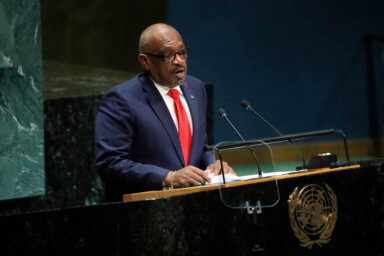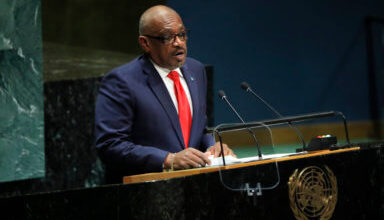Caribbean RoundUp

Antigua and Barbuda
Antigua and Barbuda Prime Minister Gaston Browne has told the Jamaica-based Sandals Resorts International (SRI) to consider removing its property from his country after he claimed that the luxury hotel brand, Sandals, has adopted a policy of not wanting to pay taxes.
Browne said that Sandals, which owns the 373-room Sandals Grande Antigua, a six-star, all-inclusive, adults-only resort, owes an estimated EC$30 million (US$11.1 million) in taxes.
He said most of the taxes owed are from the Antigua and Barbuda Sales Tax (ABST), which Sandals collected for the government and was holding on to portions of the money.
“I don’t understand why these so-called investors feel that they are the only game in town and the only stakeholders to benefit.
“So they try to wring every ounce of revenue out of the business, and they don’t want the government to get anything in the form of taxes,” Browne said, adding, “I have been through this already with Sandals, and I don’t want to go down that road with them again.”
He said that while he did not want to make the issue a public matter, he was nonetheless appealing to Sandals to cooperate with the Inland Revenue Department (IRD) to avoid another public spat.
Bahamas
Bahamas Prime Minister Philip Davis says the Domestic Minimum Top-up Tax Bill is intended to generate revenues of up to $140 million that could be used to support the country’s transformative, people-focused agenda.
He told parliament that the legislation, the first-ever corporate income tax introduced in The Bahamas, would raise revenues without negatively impacting Bahamian businesses.
“For those listening intently who are not sure what this new tax is all about, the first thing you should know is the Domestic Minimum Top-up Tax applies only to multinational corporations operating in The Bahamas that earn over 750 Million Euros (One Euro=US$1.29 cents) per year.
“If you do not own a multinational entity making 750 million Euros per year or more, which is the equivalent of US$800 million per year or more, this tax does not apply to you,” Davis told legislators.
Davis said his administration has pledged not to introduce significant new taxes that would further burden the Bahamian people.
Davis said that over the past three years, most Bahamians have experienced lower taxes, including customs duties, on a wide range of healthy and nutritious dietary staples, construction supplies, and essential goods.
In addition, the government has lowered value-added tax (VAT) from 12 to 10 %, adding that “our main method to generate increased revenues has been improved enforcement and collection.”
Caribbean
The regional workshop, “Uniting Science and Communities to Accelerate HIV Response in the Caribbean,” will be hosted in Trinidad and Tobago and focus on bridging the gap between new HIV science and providing quality service delivery to communities.
The International AIDS Society (IAS) and the Pan Caribbean Partnership against HIV and AIDS (PAN—CAP) will lead the initiative in collaboration with The Global Fund, the Pan American Health Organization (PAHO), and Plataforma LAC.
The workshop aims to provide a platform for HIV-related health and social service providers, key community actors, youth, researchers, government representatives, and policymakers to brainstorm ways to bridge the gap between evidence-based science, policy, and action.
“The goal is to create a roadmap for aligning new HIV science and evidence with how we deliver HIV-related services in our communities,” said Dr Wendy Telgt-Emanuelson, director of the Coordinating based PANCAP Unit at the Caribbean Community (Caricom) Secretariat.
“Groundbreaking HIV data and evidence emerged from AIDS 2024, the 25th International AIDS Conference. This has implications for policymakers and HIV service providers in the Caribbean.
“Our region cannot be left behind.
“Our stakeholders must be empowered to use the evidence to create innovative solutions to the HIV service delivery gaps and challenges we experience in the region.”
“The workshop seeks to provide this level of knowledge-sharing and empowerment,“ added the PANCAP director.
Grenada
The Chief Medical Officer in the Ministry of Health, Dr. Shawn Charles, has confirmed that Chikungunya and Zika — two vector-borne viruses transmitted mainly by Aedes Aegypti mosquitoes — are rising in Grenada.
“We have had one positive result that we are verifying with CARPHA,“ said Charles, who admitted that the results of other samples are pending. “By the end of the week, we hope to have more information,“ he added.
Several medical or healthcare providers first became aware of the viruses’ circulation after it was disclosed in the Ministry of Health’s Epidemiology Surveillance Bulletin for week 43, which is the period Oct. 21 to 27.
The CARPHA CMML is the Caribbean Public Health Agency’s medical Microbiology Laboratory based in Trinidad and Tobago. Its role is to provide accurate and reliable services for surveillance and control of disease in CARPHA Members.
In 2014, Grenada experienced an outbreak of Chikungunya, also called ChicV, and hundreds of people were affected with symptoms such as fever, chills, headache, muscle pain, joint pain, swelling, and stiffness, especially in the mornings, nausea, vomiting, and tiredness or weakness.
Haiti
The Organization of American States (OAS) and the Venice Commission of the Council of Europe say Haitian authorities have confirmed their intent to keep Feb. 7, 2026, as the target date for the inauguration of a newly elected president.
The Washington-based OAS said it continues to assist Haiti in developing the “enabling legal framework“ for its next general elections in collaboration with the European Commission for Democracy through Law, known as the Venice Commission.
The Venice Commission is the Council of Europe’s advisory body on constitutional matters. It provides legal advice to its member states and, in particular, assists states wishing to align their legal and institutional structures with European standards and international experience in the fields of democracy and human rights.
The Venice Commission also helps to ensure the dissemination and consolidation of a common constitutional heritage, “playing a unique role in conflict management and providing emergency constitutional aid to states in transition,“ the OAS said.
In keeping with the Commission’s policy and in line with OAS Secretary General Luis Almagro’s commitment, the OAS said the Venice Commission’s work is being conducted “in close collaboration with the Haitian state and proceeds from the basis that all solutions to the current crisis must be Haitian-led and Haitian-approved.“
“While participants discussed establishing intermediate steps toward this goal, all parties stressed that the re-establishment of security is a fundamental precondition for holding the referendum and the elections,“ said the OAS and the Venice Commission.
Jamaica
The Independent Commission of Investigations, Indecom, has expressed concern that many police officers continue to be prosecuted for severe offenses in Jamaica.
Indecom is the state agency tasked to undertake investigations concerning actions by members of the security forces.
According to the agency’s commissioner, Hugh Faulkner, he was hoping that the Police High Command would review a report prepared by Indecom and effect changes to police operations.
He said the high command should review the police conduct to prevent them from being charged.
Speaking during a recent press conference, Faulkner revealed that from January 2011 to December 2023, more than 150 cases involving police officers who had been charged were brought before the courts.
The commissioner also called for the full implementation of body-worn cameras by the Jamaica Constabulary Force (JCF) and all law enforcement bodies.
Faulkner then warned that the failure to activate body-worn cameras during police operations not only undermines accountability but also deepens public mistrust in law enforcement.
The commissioner added that the current rate of fatal and non-fatal shootings by security forces this year is projected to have the highest number of incidents than in recent years.
“Where they have been worn, the majority of cases have shown that officers fail to turn on the body-worn cameras, especially where a shooting incident occurs.”
“Our new case management system ensures that the data is captured on every event that inquiry is made and documented. Equally, the deployment of body-worn cameras to the specialized policing teams has not been introduced at all, and these teams are deployed in prepared and planned operations.
“The commission again called for the swiftest and fullest implementation of this critical investigative equipment and tool for the procurement of justice.”
— Compiled by Devika Ragoonanan





